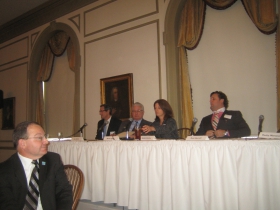The End of Jobs…Hurray?
by Marty Nemko
By now, everyone knows the unemployment rate severely masks the true employment situation. Not only does it not count people who have given up on looking for work, it doesn’t count the underemployed: for example, college-degree holders with jobs that don’t require a degree, or people working part-time/temp when they’d prefer a full-time, secure position.
Ever more jobs are automated. Bank teller jobs have been
replaced by ATMs, supermarket cashier jobs by self-checkout, tolltakers by
FastTrak. In the face of increased minimum wage and living wage ordinances,
robotic fast-food preparers and servers have been developed: custom burger
and burrito makers in California, sushi
makers in Japan, cookie
makers in Poland. The automated
barista may replace that failsafe job—Starbucks barista. There’s a robot
bookstore clerk and IBM is developing a robot
retail clothing clerk. Many but not
all customers will prefer that to the $10 an hour pushy but often incompetent
sales clerk. And retail employers will prefer not having to worry about
employees taking sick days when not sick, being bad with customers, and/or
quitting soon after being trained—turnover
in retail is over 100 percent. Bartending jobs are at-risk. I just went to a dance at a venue where the bartender was a machine: stick your credit card in, pick your
drink from the screen, and out it comes, just like from a soda
vending machine. Leading companies such as Google, FedEx, and Amazon are
investing big in driverless vehicles—bye-bye jobs as taxi drivers, truck
drivers, bus drivers, even train engineers. Even home-building is at risk.
3D-printers are projected to be able to print homes out
of concrete in under a day—bye-bye thousands of construction jobs.
And of course, there’s offshoring. While politicians keep urging more Americans to major in a tough science, technology, engineering, or math (STEM) field, ever more of those tech jobs are being offshored, notably to India and China, which have a long tradition of valuing science, math, and technology, and populations many times the size of the U.S.’s. Already, there's an oversupply of STEM graduates. Evidence:THIS and THIS and THIS and THIS.That can only accelerate as ever more work product can be sent over the internet. Ever more companies are figuring, “Why should I pay American wages plus Workers Comp, Disability, Social Security, ObamaCare, paid family leave, Americans with Disabilities Act compliance costs, plus that of ever increasing employee lawsuits, when I can get someone in Asia for a small fraction of the cost? Are American workers really so superior?”In a TED talk, Dr. Thomas Frey, Google’s top-rated futurist speaker, projects that, by 2030, half of all jobs worldwide, two billion, will be lost. An Oxford University study projects that half of U.S. jobs will be lost just to automation. One could quibble with the percentage but our job security certainly will be at ever greater risk.
Then what will happen?
It’s easy to project a dystopian scenario: mass unemployment
leading to mass destitution, armed robberies, and drug abuse to anesthetize the
pain.
With fewer people earning good incomes, only companies that provide basic products and services will thrive. That will be good for the environment. For example, car manufacturing will shrink and sell only affordable, economical cars. And people will repair and repair their old vehicles rather than buy new. Even if government takes over the airlines, the cost of planes, fuel, maintenance, and personnel will discourage people from flying. Again, good for the environment.
Also, today’s materialistic society tempts people to cut ethical corners to make more money so they can buy more stuff: new car, nicer clothes and jewelry, fancier vacations, live in 3,000 fancy square feet rather than 1,000 serviceable ones. In an economy in which fewer people are working let alone earning big bucks, materialism would be less core to societal values, reducing those pressures to be unethical.
Plus, with people having more time, more people will replace gratification from “stuff” with gratification from learning, creative arts, and in relationships from mentorship to family to involvement in pro-social organizations: from Rotary to SmileTrain to Mensa.
In the meantime
Even if you have a good job, might this column’s look at the future justify reconsidering your priorities? Yes, perhaps do more to secure your employment: upgrade your skills, work a little harder, build relationships with people who can abet your career, consider starting a business. But might replacing a materialistic lifestyle with a more meaningful one be good preparation not only for a scarce-jobs future but for your current life?


















.jpg)











